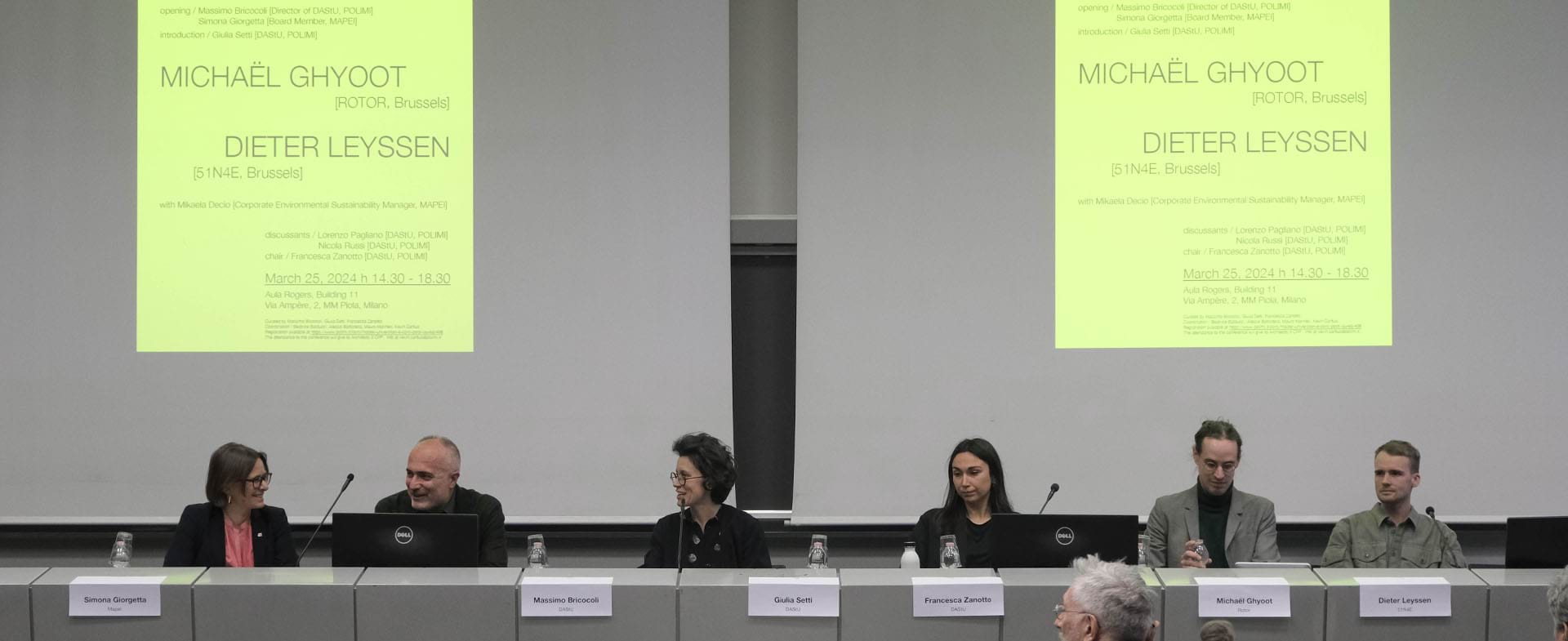
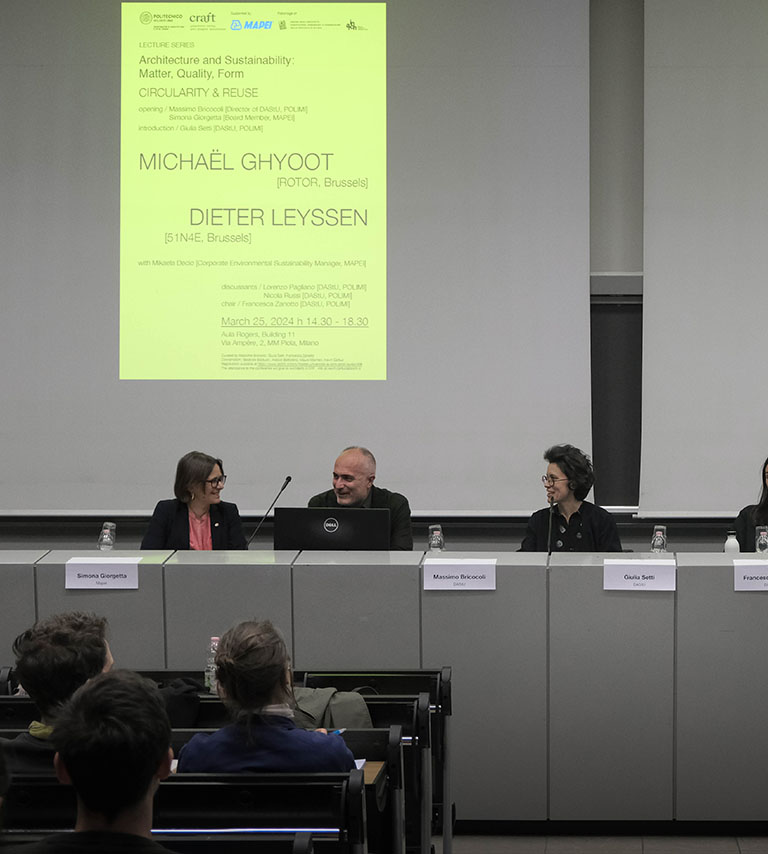
Sustainability
/
4/8/2024
Architecture and sustainability: five events promoted by Mapei and the Politecnico of Milan
Deepening the relationship between architecture and sustainability. This is the aim of the five meetings organised by the Department of Architecture and Urban Studies and involving international design studios.
"Architecture and Sustainability: Matter, Quality, Form". This is the title of the series of meetings organised by Mapei in collaboration with the Department of Architecture and Urban Studies (DAStU) of the Politecnico of Milan. The aim is to build collaboration programmes between universities, administrations and companies, innovating architectural design from a sustainability perspective.
Architecture and sustainability
Always close to culture and committed to provide high quality training, Mapei, leader in chemical products for the building industry, is promoting a cycle of meetings focusing on the relationship between architecture and sustainability organised by DAStU, the Department of Architecture and Urban Studies of the Politecnico of Milan. “Architecture and Sustainability: Matter, Quality, Form” is the title of the cycle of five meetings, created with the aim of exploring various aspects of the relationship between architecture and sustainability. Each day is dedicated to a different aspect of this fundamental binomial, allowing participants to deepen their knowledge and share innovative ideas for tackling the environmental crisis that our planet is facing, promoting a constructive debate between architects, experts in the field, university professors, researchers, and students.
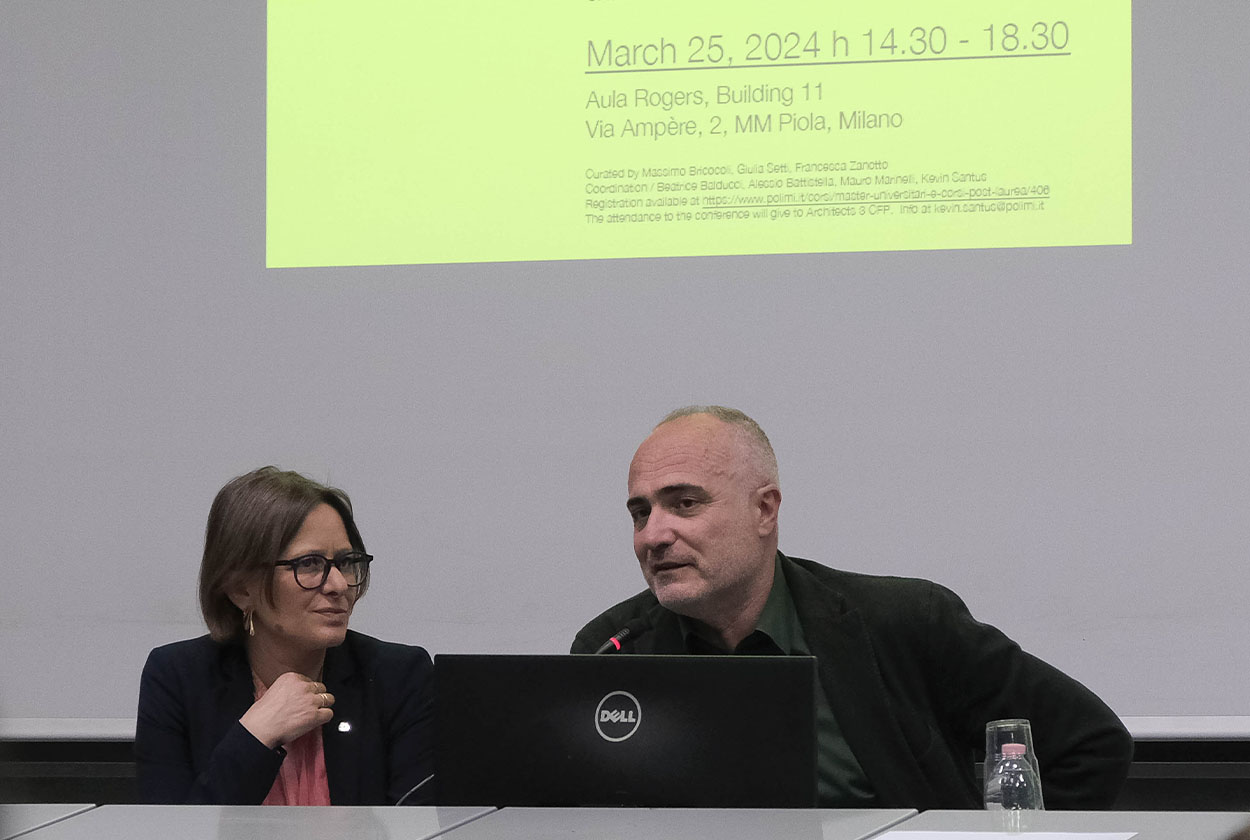
Circularity & Reuse
On Monday 25th March, the first meeting was held at the Aula Rogers of the Milan Polytechnic entitled "Circularity & Reuse". After an introduction by Massimo Bricocoli, Director of the DAStU, Simona Giorgetta, a member of the Mapei Board of Directors and architect, explained the importance of sustainability for Mapei and of thinking sustainably before designing, teaching it to future generations. Afterwards, the architects Michaël Ghyoot from the ROTOR studio and Dieter Leyssen from the 51N4E studio, both based in Brussels, illustrated the results of an approach that sees the project not as a linear process but as a circular development, in which the value of materials, places and social relations is re-evaluated, affecting the overall sustainability of architecture.
Increasingly sustainable architectural projects
After the speach by the two Belgian architects, Mikaela Decio, Corporate Environmental Sustainability Manager at Mapei, also contributed to the discussion, telling the audience of students present about the Mapei's commitment to contribute to sustainable building. Finally, we had the pleasure of interviewing the Director Massimo Bricocoli, who emphasised the importance of adopting a sustainability perspective in architectural design, not only to guarantee the quality of interventions, but also to contribute to the future of our cities and urban life. Bricocoli emphasised the importance of collaboration between universities, administrations and companies in order to innovate architectural design in a sustainable way, taking into account natural, cultural and social resources.
Appropriated Technology
The second meeting entitled “Appropriated Technology” was held on Monday 22nd April. The guest architects were Anupama Kundoo (Anupama Kundoo Architects, with firms in Pondichery and Berlin) and Raul Pantaleo (TAMassociati, Venice), who debated with DAStU lecturers Alice Buoli and Stamatina Kousidi in a discussion chaired by lecturer Alessio Battistella. Mapei was represented by Elisa Portigliatti, Corporate Key Account Manager of the Sport Flooring Line.
.jpg?sfvrsn=be6a5a88_3)
The discussion explored interaction between architecture, technology and sustainability, considering such crucial factors as climate change, cultural context and the availability of resources. By assessing these parameters, designers and architects can identify the most suitable technology for a given context while also ensuring the sustainability of their work. The guest architects spoke about their projects adopting a holistic approach to design that embraces both tradition and innovation.
Materials, Techniques, Local Care
‘Materials, Techniques, Local Care’ is the name of the third event that was held on Monday 6th May. Josep Ricart from the Barcelona-based Harquitectes firm and Giacomo Borella from the Milan-based Albori firm were the guests at the meeting. The subject of the debate was the innovative use of traditional materials and how to introduce new buildings into existing settings in a conscientious way. A selection of projects were chosen to illustrate significant stances and viewpoints about the relationship between architecture and sustainability as regards the materials chosen and settings in which work is carried out. Grazia Signori, an Architectural Stone Paving Line Specialist at Mapei, brought the meeting to a close by focusing on how stone materials are one of the most distinctive traits of a place's identity. Starting from the different types of paving found in historic town centres, she pointed out the need to preserve this heritage, upgrading it with suitable products and technologies in a virtuous circle of recovering/recycling old materials.
Alpine Ways
In the fourth meeting entitled Alpine Ways, the contemporary Alpine scenario was discussed as a fertile context for recent architectural experimentation. Even territories far from the big cities have demonstrated the ability to generate extraordinary architecture, thanks to professionals capable of facing the challenges of our time with sensitivity and originality. Sustainability has found surprising expressions in the Alps, going beyond a purely technological approach to embrace various aspects of architectural practice and careful attention to social needs.
The international guests at the event were Markus Innauer of the Innauer Matt studio in Bregenzerwald (Austria) and Rina Rolli of the Studioser studio in Zurich and Lugano (Switzerland). They shared their experiences with the students and scholars in the room, illustrating how these places have influenced their work and presenting their interpretation of sustainability in Alpine contexts, also taking into account the impact of their work on their communities. In addition, Anna Bravo, Group Leader at Mapei Research &Development Central Analytical Department, emphasised the importance of the study and analysis phase of materials in the laboratory for the construction of buildings in extreme contexts. She focused on solutions capable of ensuring high and durable performance of concrete buildings subjected to harsh climates or providing adequate thermal insulation for structures built in these environments.
The last meeting
At the last meeting on 27 May entitled “Sustainable Social Housing”, Spanish architect David Mayol explored the topic of sustainability in social housing, presenting the concrete example of the work carried out by the Balearic Institute of Housing (IBAVI), a public company of the Ministry of Agriculture, Environment and Territory of the Government of the Balearic Islands. IBAVI represents a virtuous model of an institution committed to facilitating and improving access to housing for the region's residents while taking care of the aesthetics and sustainability of its projects.
“This course, conceived by the Department of Architecture and Urban Studies of the Milan Polytechnic,” comments Simona Giorgetta, a member of Mapei's Board of Directors, “has seen the participation of guest architects and professionals from Mapei in a series of meetings that have opened up new horizons for the architecture of tomorrow. An architecture increasingly oriented towards the union of beauty, materials, accessibility and economic benefits, without forgetting sustainability, a central theme for our company. For Mapei, sustainability is not just a claim, but a real way of working that permeates research, production and the very way of doing business. Always close to culture and committed to training, Mapei is proud to support a Department such as DAStU, an excellence on the international university scene’.





.jpg?sfvrsn=2d807888_1)
.jpg?sfvrsn=c807888_3)
.jpg?sfvrsn=ed6a5a88_3)
.jpg?sfvrsn=b7a72088_3)
.jpg?sfvrsn=a5a72088_3)


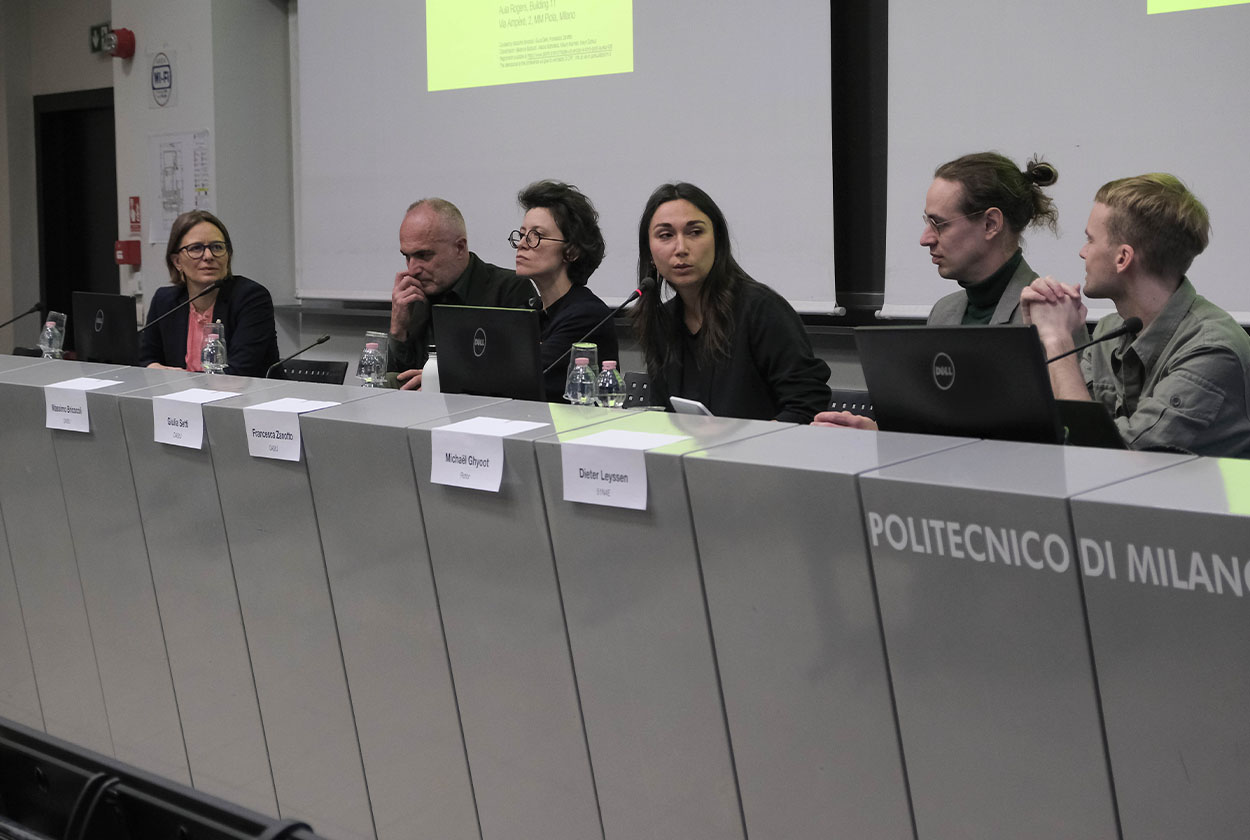

.jpg?sfvrsn=7cea7888_3)
.jpg?sfvrsn=7aea7888_3)
.jpg?sfvrsn=17ea7888_3)
.jpg?sfvrsn=d4ea7888_3)
.jpg?sfvrsn=bbea7888_3)
.jpg?sfvrsn=b9ea7888_3)
.jpg?sfvrsn=b0ea7888_3)
.jpg?sfvrsn=c16a5a88_1)
.jpg?sfvrsn=b86a5a88_1)
.jpg?sfvrsn=a86a5a88_1)
.jpg?sfvrsn=b76a5a88_1)
.jpg?sfvrsn=87755a88_1)
.jpg?sfvrsn=716a5a88_1)
.jpg?sfvrsn=89755a88_1)
.jpg?sfvrsn=7a6a5a88_1)
.jpg?sfvrsn=9c755a88_1)
.jpg?sfvrsn=a3a72088_1)
.jpg?sfvrsn=9aa72088_1)
